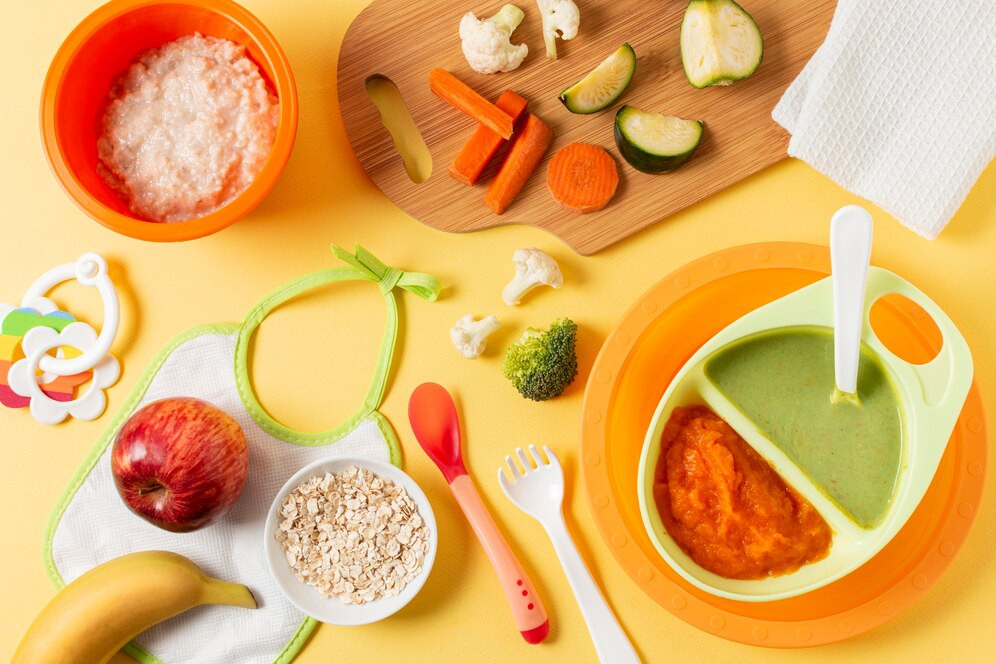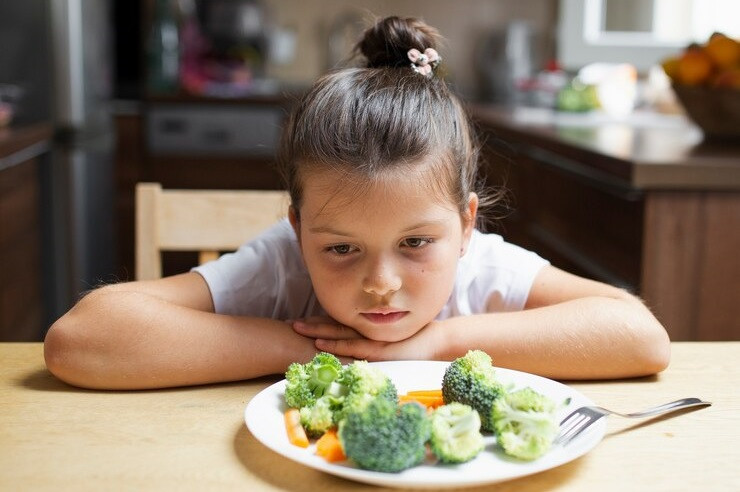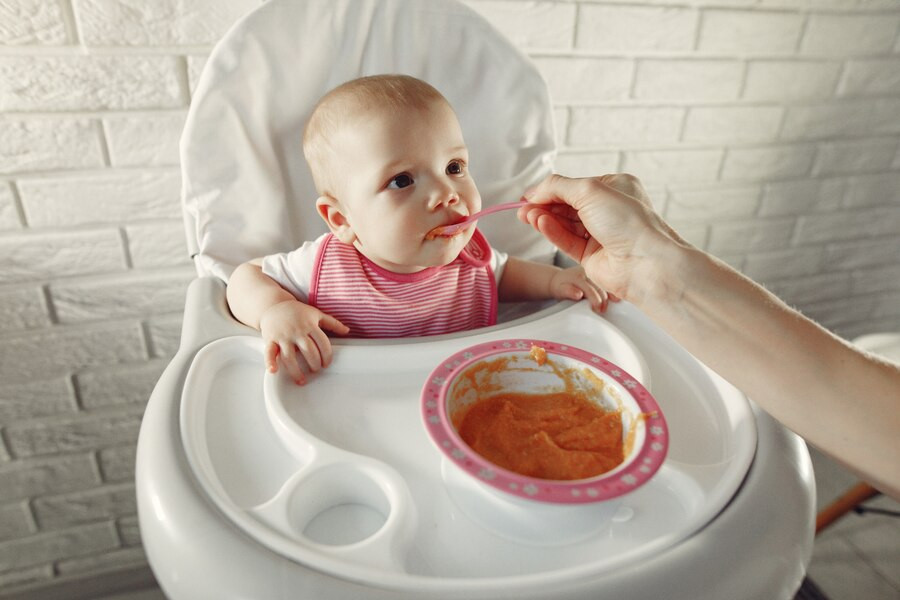Pencernaan bayi yang belum mencapai usia 6 bulan masih dalam proses perkembangan sehingga belum siap untuk menerima makanan yang lebih kompleks selain ASI. ASI adalah makanan yang paling ideal dan seimbang untuk bayi di usia sebelum 6 bulan.
Memperkenalkan makanan atau cairan selain ASI kepada bayi sebelum mencapai usia 6 bulan dapat meningkatkan risiko penyakit dan masalah kesehatan yang serius, seperti diare, kekurangan nutrisi, berkurangnya produksi ASI, botulisme serta risiko obesitas dan penyakit kronis lain di kemudian hari.
Makanan dan Minuman yang Tidak Boleh Diberikan pada Bayi Sebelum 6 Bulan
Berikut adalah daftar makanan dan minuman yang sebaiknya tidak diberikan pada bayi sebelum mencapai usia 6 bulan, di antaranya:
Air putih
Walau air putih dianggap sebagai sesuatu yang sehat, air putih tidak disarankan diberikan pada bayi sebelum mencapai usia 6 bulan karena beberapa alasan berikut:
- ASI atau susu formula sudah mencukupi kebutuhan cairan bayi selama enam bulan pertama kehidupannya
- Memberikan air putih berlebihan dapat mengganggu keseimbangan elektrolit tubuh bayi
- Memberikan air putih berlebihan dapat menyebabkan risiko keracunan air yang mengakibatkan gejala kelemahan, muntah, kejang, bahkan koma
- Bayi yang terlalu banyak minum air putih tidak mendapatkan asupan nutrisi yang cukup
- Memberikan air putih pada bayi sebelum usia 6 bulan dapat menyebabkan gangguan pencernaan, termasuk diare dan sembelit
Baca Juga: Kandungan Nutrisi di Dalam Air Susu Ibu (ASI) dan Rekomendasi Terbaru Menurut WHO
Madu
Madu sebaiknya tidak diberikan pada bayi di bawah usia 1 tahun karena dapat meningkatkan risiko botulisme infantil. Botulisme infantil adalah penyakit serius yang disebabkan oleh bakteri Clostridium botulinum.
Bakteri ini menghasilkan racun di dalam usus bayi yang belum matang, yang dapat menyebabkan gejala seperti lemah, kesulitan bernapas, kelumpuhan, bahkan kematian.
Gula
Gula sebaiknya tidak diberikan pada bayi sebelum usia 6 bulan, dan, bahkan anak-anak sebelum usia 2 tahun. Gula tinggi kalori namun tidak menyediakan nutrisi yang penting bagi pertumbuhan dan perkembangan bayi. Memberikan bayi makanan dan minuman yang mengandung tambahan gula berlebihan dapat meningkatkan risiko terkena penyakit kronis seperti obesitas, diabetes, dan penyakit jantung.
Selain itu, gula dalam makanan dan minuman dapat menyebabkan lonjakan gula darah yang cepat yang diikuti penurunan tajam, yang kemudian memengaruhi tingkat energi dan konsentrasi anak.
Baca Juga: Manfaat Memberikan Air Susu Ibu (ASI) pada Bayi Prematur
Garam
Bayi sebaiknya tidak diberi garam, terutama sebelum usia 6 bulan. Garam dapat memberikan beban tambahan pada ginjal bayi yang belum sepenuhnya matang. Bayi di bawah usia 6 bulan biasanya memperoleh semua kebutuhan natriumnya dari ASI atau susu formula sehingga tidak membutuhkan garam.
Selain itu, garam dapat meningkatkan risiko tekanan darah tinggi dan masalah kesehatan lainnya.
Demikian pula dengan bayi berusia 7-12 bulan, mereka masih bisa memperoleh asupan natrium dari ASI atau susu formula. Mereka tidak perlu mendapat makanan dengan tambahan garam. Garam mungkin baru dianjurkan ditambahkan saat anak berusia di atas 1 tahun.
Dokter menyarankan untuk menunggu hingga bayi mencapai usia 6 bulan sebelum memperkenalkan makanan padat pertamanya. Memberikan makanan padat sebelum usia 6 bulan tidak disarankan karena sistem pencernaan bayi yang belum matang sepenuhnya. Beberapa bayi mungkin sudah siap menerima makanan padat pertamanya saat berusia 4 bulan, namun ini juga perlu mendapatkan rekomendasi dan evaluasi dokter terlebih dahulu.
Masih merasa bingung soal pemberian makanan pendamping ASI anak? Anda bisa memanfaatkan layanan konsultasi kesehatan bersama dokter kami dengan mengunduh aplikasi Ai Care melalui App Store atau Play Store.
Mau tahu informasi seputar kehamilan, menyusui, kesehatan wanita dan anak-anak? Cek di sini, ya!
- dr. Monica Salim
NHS UK (2023). Foods to avoid giving babies and young children. Available from: https://www.nhs.uk/conditions/baby/weaning-and-feeding/foods-to-avoid-giving-babies-and-young-children/
Kids Health (2021). Feeding Your Newborn. Available from: https://kidshealth.org/en/parents/feednewborn.html
Cleveland Clinic (2023). Benefits of Breastfeeding. Available from: https://my.clevelandclinic.org/health/articles/15274-benefits-of-breastfeeding
UNICEF. Feeding your baby: When to start with solid foods. Available from: https://www.unicef.org/parenting/food-nutrition/feeding-your-baby-when-to-start-solid-foods
Jennifer White (2021). Dangers of Feeding Your Baby Solids Too Soon. Available from: https://www.verywellfamily.com/potential-risks-when-you-start-baby-food-early-284371
Kids Health (2023). Infant Botulism. Available from: https://kidshealth.org/en/parents/botulism.html
WebMD (2023). What You Need to Know About Water for Infants. Available from: https://www.webmd.com/parenting/baby/what-you-need-to-know-water-infants
Eva Dasher (2022). When can babies have sugar?. Available from: https://www.babycenter.com/baby/solids-finger-foods/when-can-my-baby-eat-candy_1368489
Alina Petre, MS, RD (NL) (2021). Salt for Babies: How Much Is Safe?. Available from: https://www.healthline.com/nutrition/salt-for-babies
Kids Health (2021). When Can My Baby Start Eating Solid Foods?. Available from: https://kidshealth.org/en/parents/solid-foods.html











